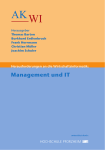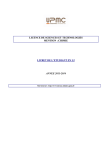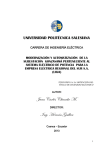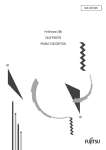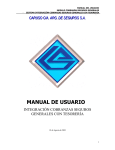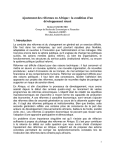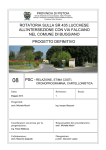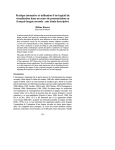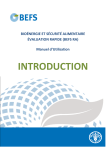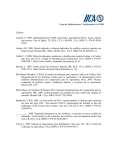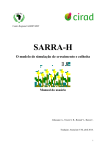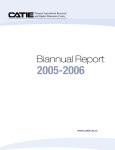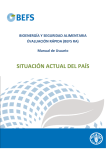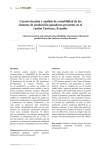Download Dr. Muhammad Ibrahim-CV
Transcript
Curriculum Vitae Muhammad Akbar Ibrahim Nationality Date of Birth Home Address Telephone Email address Field of Specialisation Major Professional Achievements Guyanese 20th June, 1958 Apartment 4, Condominium Sunset, Los Guayabos, San Jose, Costa Rica Work: +506 2216 0230 Cell: +506 8438 0978 [email protected] Livestock and Environment • • • • • • • • • • • Recognised as a leader for innovation and development of sustainable and climate smart livestock systems by stakeholders in Latin America Created the livestock and environmental management program of CATIE that has had significant impacts in transition of traditional systems to environmentally friendly and competitive livestock systems in Latin America Implemented a strategy for strengthening agriculture innovation systems in Latin America and the Caribbean including the strengthening of regional networks Developed methodologies and technologies on silvopastoral, and sustainable livestock systems that have been adopted by livestock farmers and contributed to improvements of their livelihoods Contributed to the development of regional and national policies for sustainable livestock systems Negotiated more than 25 million dollars (USD) for funding of projects which have generated significant results on sustainable livestock systems and contributed to institutional strengthening and the design and implementation of public policies in the region Strengthened cattle farmers organisations and related NGOs and relevant organisations that are playing a pivotal role in innovation of livestock systems As a major professor, graduated more than 75 MSc. students and 5 PhD students Numerous scientific publications in international and regional Journals Contributed to the insertion of CATIE and IICA in the Global agenda for Livestock: from vision to Action Organised five Latin American congress on Agroforestry and silvopastoral systems 1 Education Years attended From To 1990 1994 1987 Name of University Wageningen Agricultural University, The Netherlands 1989 CATIE, Costa Rica Employment record 1981 1985 University of Guyana, Guyana From May 2014 To Present Employee IICA Degree obtained Doctor of Agricultural and Environmental Sciences (Ph.D.) MSc. Agricultural sciences and natural resources, with emphasis in animal nutrition Bachelor of Science in Agriculture- pass with distinction Title of Post Manager of the Innovation for Productivity and Competitiveness Program and Associate Director for IICA’s Technical Cooperation Program Responsibilities • • • • • • • • Manager of the Technical Program ‘Innovation for Productivity and Competitiveness’ of IICA Leader of the flagship project ‘Resilient Agriculture and Environmental Risk Management’ Develop and implement a strategy for innovation in the agriculture sector at a national and regional scales Coordination of actions related to IICA’s cooperate programs (PROCITROPICOS, PROSICUR, PROMECAFE, Technical Groups of CAC, PROCINORTE, CIAO) on Agricultural Innovation Systems in Latin America and the Caribbean region Preparation of proposals within the framework of the Medium term plan, for external funding Supervise and provide technical support for the implementation of projects with external funding Collaborate in the development of national and regional polices for innovation in the agriculture sector Negotiation of funding for external projects 2 From Nov 2012 To April 2014 Employee IICA Title of Post Representative of IICA in Belize Responsibilities • Develop and implement IICA’s country strategy in Belize • Participate in the development of an agricultural policy and strategy and business plan for Belize • Provide technical cooperation to the Government of Belize in the areas of agriculture, environment and natural resources, and rural development • Negotiate and implement a EU project (3.5 million EU) to strengthen the Sugar industry research and development Institute (SIRDI) • Prepare a medium term plan for the Sugar Industry Research and Development Institute • Provide technical support for strengthening the Agricultural Faculty of the University of Belize • Develop collaboration with international, regional and national organisations From May 2002 To October 2012 Employee CATIE Title of Post Leader of GAMMA (Livestock and Environmental Management Program) Responsibilities • Creation of CATIE’s Livestock and Environmental Management Program (GAMMA) • Develop and implement a regional strategy for CATIE’s Livestock and Environmental Management Program • Coordinate with staff of GAMMA and related programs of CATIE, to develop and implement a research strategy, involving systemic approaches and /or methodologies for sustainable and climate smart livestock systems • Coordinate with staff of GAMMA in the development of a business plan for sustainability of the program • Develop a methodology for payment of environmental services in Livestock systems in Latin America • Establish cooperation with international (e.g., CIRAD, NINA, ILIR, CIAT, EMBRAPA, FAO, ICRAF) and regional organizations (e.g., CIPAV, NITLAPAN, CORPOICA, INIAs) to conduct research in the field of livestock and environment • Establish cooperation with donors (e.g. GEF, Worldbank, EU, Nestle, Netherlands, Norway cooperation, IDB-FONTAGRO, 3 European Union) to negotiate funding for research and development projects • Develop and implement regional projects on livestock and environment and recovery of degraded pasturelands • Conduct research in the field of livestock and environment and silvopastoral systems • Position CATIE as the focal point for Latin America within the livestock and environment initiative and the Global agenda for Livestock: from vision to action- coordinated by FAO/ILRI, and as a focal point with GEF and Worldbank • Negotiation of MSc and PhD scholarships for CATIE’s students involved in studies related to livestock and environment • Taught a course on Silvopastoral systems at the postgraduate school of CATIE • Supervision (major supervisor and committee member) of MSc and PhD students of CATIE • Develop and implement training program in the area of livestock and environment • Provide technical support for the development of regional and national policies for sustainable livestock systems • President of the organising committee and scientific director for the Latin American congress on agroforestry and silvopastoral systems (every 2 years) • Supervision of activities of GAMMA staff From To Employee Title of Post April 1995 April CATIE Leader of Silvopastoral 2002 Unit, Department of Agroforestry Responsibilities • Develop work plan for the silvopastoral unit of CATIE • Conduct research to evaluate interactions in silvopastoral systems • Establish cooperation with international and regional organizations to conduct research on silvopastoral systems • Taught a course on silvopastoral systems • Negotiate scholarships for CATIE’s students • Supervision of MSc students of CATIE • Negotiation of funding for externally funded project • Implementation of externally funded projects • Organization of international symposium on silvopastoral systems • Develop networks for scaling out/up of silvopastoral systems for example LEAD-FAO, national networks on silvopastoral systems 4 From September 1985 To August 1987 Employee NDDP-Guyana Title Senior Dairy Officer Responsibilities • • • • Research experience Managerial and Leadership skills Provision of technical assistance to farmers and organizations to establish improved dairy systems Organisation of farmers to manage communal pasture plots Training of local experts on improved dairy models Develop national plan for dairy development in Guyana Managed a multi-disciplinary research team at CATIE to develop improved silvopastoral systems using systemic and participatory approaches and methodologies. Research was conducted to understand tree-pasture-animal interactions and used to design improved silvopastoral systems including the selection of improved forage species that are tolerant to shade. This research area included the development of a methodology for recovery of degraded pasturelands in Central America. Research was also conducted on the quantification of ecosystem services in traditional and sustainable livestock systems, and an innovative methodology was developed for payment of environmental services generated with silvopastoral systems, including a certification scheme for sustainable cattle systems which was developed with Rainforest alliance. It should be mentioned that the results from the research conducted at CATIE is used to implement policies for sustainable intensification of livestock systems including countries such as Costa Rica, Nicaragua, Honduras, Colombia, Ecuador and Brazil. Currently, involved in the management of IICA’s technical cooperation program which includes development of strategic and annual work plans to achieve the objectives of IICA. The work involves the supervision of technical staff of IICA at headquarters and in the 34 offices of the institute. One of the major achievements in this position at IICA has been in the coordination with the national research organizations and actors in the private sector to modernize the regional networks (PROCIS, PROCINORTE, PROMECAFE, PROCISUR, CIAO) to have greater impacts in the agriculture innovation systems in Latin America and the Caribbean countries. In this work managerial skills are also applied in the negotiation of externally funded projects and in implementing of a system to evaluate the effectiveness and efficiency in the generation of deliverables. 5 Managerial and leadership skills were also demonstrated during my seventeen years working at CATIE. A livestock and environment program (GAMMA) was created and consolidated with a multi-disciplinary team with gender participation, which gained recognition in Latin America and with international organizations for its work carried out on innovative livestock systems, training, and in development of policies for sustainable livestock systems. This was achieved through the establishment of effective and functional institutional collaboration at a national (Ministries, NARS, Farmers organizations), regional (CIPAV, NITLAPAN) and international (ILRI, ICRAF, CIRAD, CIAT, NINA, NESTLE) scales. Alliances were forged between private (e.g., FEDEGAN, CORFORGA, Rainforest Alliance) and with public organizations to implement policies for sustainable livestock systems. A strategic and research plan was developed for the program which emphasized the need for sound financial management and resource mobilization for long term sustainability of the program, and through the implementation of this plan four regional medium-size (4-5 million USD) and numerous small projects were negotiated to consolidate financing for the program. Furthermore, the effectiveness of good planning and resource mobilization was demonstrated through: 1) Significant number of MSc and PhD students graduated in the framework of the program 2) Large number of extension workers trained and institutions and organizations strengthened 3) Number of publications in international and regional journals and in book chapters 4) Policies promoted in the region 5) Impacts on smallholder cattle systems 6) The organization of four international congresses on agroforestry and silvopastoral systems Grants/fund raising and scholarships Good experience in the mobilization of resources or grants for funding projects on sustainable agriculture and livestock systems. Experience working with different donor organizations includingGEF, World Bank, NORAD, EU, New Zealand technical cooperation, IDRC, SDC, Netherlands cooperation. A list of some of the major grants in which I participated to negotiate and implement is provided below: 6 • Coordinate the preparation of a proposal “Central America Coffee Program for Integrated Management of Coffee Rust”. Funded by the EU. Funds already earmarked for this project. Partners- IICA, CATIE, CIRAD, PROMECAFE (IICA). USD 20 million (2014-2019) • “Delivering multiple global environmental benefits through sustainable management of production landscapes- Honduras”, funded by GEF. USD 3 million (2014-2018) • “Policymix: assessing the role economic instruments in Policy mixes for biodiversity conservation and ecosystem services provision”. Funded by EU. € 0.7 million (2010-2014) • “Sustainable Management of Agricultural Territories in Mesoamerica”. Funded Norway 4.5 million USD (2009-2013) • Climate Change and Biodiversity Loss: “The Effects on Ecosystem Services in Tropical Forests in Central America” Carried out jointly by the Basque Centre for Climate Change (BC3) and the Tropical Agricultural Research and Higher Education Centre of Costa Rica (CATIE). Funded by BBVA. USD 500.000 (2009-2011) • Integrated Silvopastoral Approaches to Ecosystem Management (GEF/World Bank LEAD/FAO). Regional Coordinator of this project which was implemented in Colombia, Nicaragua and Costa Rica Financing: USD 4.5 million GEF, USD 500,000 from FAO/LEAD co-funding USD 5 million). (2002 -2008) • Multi-stakeholder participatory development of sustainable land use alternatives for degraded pasture lands in Central America. This project was implemented in Honduras, Nicaragua and Guatemala is financed by Norwegian international cooperation USD 6 million. (2002 – 2008). • Carbon sequestration in pasture and silvopastoral systems in the Tropics. Funded by Netherlands Cooperation. USD 2 million. (2004- 2009) • WAFLA/ Integrated management of water resources in semi/arid zone. Project was implemented with European and Latin American partners and with a network of 20 institutions. € 2.3 million. (2005-2010) 7 Funding for scholarships Teaching experience • Competitiveness and added value of farm products produced in coffee and silvopastoral systems). Research project implemented in Costa Rica, Nicaragua and Colombia. Funded by FONTAGRO/IDB. USD 500.000 million. (2005-2009) • Fragment: Impacts of tree cover on productivity and biodiversity in agricultural landscapes dominated with cattle Funded by EU. € 1 million. (2002-2008) • Livestock and Environment Initiative (LEAD) funded by FAO. USD 600,000. ( 2000-2007) Negotiated more than 60 scholarships for MSc students and eight scholarships to fund PhD students at CATIE • • • • • Professional Memberships • • • • • • Awards Recognition • • • • 18 years’ experience as a Research professor at the postgraduate school of CATIE Participated in the review of the postgraduate program Taught courses on forages and ruminant nutrition, and on silvopastoral systems at CATIE As major supervisor, graduated more than 75 MSc students, and 4 PhD students of CATIE Affiliate professor at the University of Chapingo Member of the Global Livestock Agenda, which is coordinated by FAO/ILRI. Vice President of the organizing committee of the Latin American congress on Agroforestry and Silvopastoral systems Member of the editorial committee of Tropical Grasslands Representative of IICA in the CCAC- Climate and Clean air Coalition to reduce short lived Climate Pollutants: component on livestock, emissions and manure management Representative of IICA in the FONTAGRO steering committee Representative of IICA in the steering committees of PROCISUR, PROCITROPICOS and PROMECAFE 1985- Vice Chancellor award for best graduating student of the faculty of agriculture at University of Guyana 1985-GAIBANK gold medal for best graduating student of the faculty of agriculture at University of Guyana 1997- Designated best research/professor and worker at CATIE for year 1996 1997- 2010- Received awards from the student council at CATIE on four occasions for best professor of the Department of Agroforestry and Agriculture 8 List of Relevant Publications Chapters in Books • • • • • • • • Bucheli, P. Benjamin, T. Rush, G. Ibrahim, M. Casals, P. Pugnaire, F. 2013. Estrategias de los árboles en SSP en el uso eficiente del agua y la tolerancia a la sequía. 25-30p. En: D. Sánchez, C. Villanueva, G. Rusch, M. IIbrahim, F. DeClerck (eds). . Estado del recurso arbóreo en fincas ganaderas y su contribución en la producción en Rivas, Nicaragua. CATIE, Turrialba, Costa Rica. García-Cruz, F. Ibrahim, M. 2013. Los árboles en los potreros para la reducción del estrés calórico del ganado en los trópicos. 36-41p. En: D. Sánchez, C. Villanueva, G. Rusch, M. Ibrahim, F. DeClerck (eds). . Estado del recurso arbóreo en fincas ganaderas y su contribución en la producción en Rivas, Nicaragua. CATIE, Turrialba, Costa Rica. Ibrahim, M. Villanueva, C. Sepúlveda, C. Tobar, D. Chuncho, G. 2013. Module 8.: Climate-smart Livestock : Adaptation and mitigation needs. 216-220 pag. En FAO 2013. Climate SmartAgriculture. Sourcebook. Roma. Villanueva, C. Ibrahim, M. Lombo, F. Pérez, N. 2013. Potencial de las leñosas forrajeras en potreros para la alimentación del ganado en la época seca. 46-50p. En: D. Sánchez, C. Villanueva, G. Rusch, M. Ibrahim, F. DeClerck (eds). . Estado del recurso arbóreo en fincas ganaderas y su contribución en la producción en Rivas, Nicaragua. CATIE, Turrialba, Costa Rica. Francesconi, W. Montagnini, F. and Ibrahim, M. 2011. Living fences as linear extensions of forest remnants: a strategy for restoration of connectivity in agricultural landscapes. Pp. 115126 In: F. Montagnini and C. Finney (Eds.). Restoring degraded landscapes with native species in Latin America. Nova Science Publishers, New York. Francesconi, W. Montagnini, F. and Ibrahim, M. 2011. Using bird distribution to evaluate the potential of living fences to restore landscape connectivity in pasturelands. Pp. 133-142 In: Montagnini, F., Francesconi, W. and Rossi, E. (eds.). Agroforestry as a tool for landscape restoration. Nova Science Publishers, New York. 201pp. Villanueva, C. Ibrahim, M. Casasola, F. and Sepulveda, C. 2011. Ecological Indexing as a tool for de Payment for ecosystem services in Agricultural landsacape: The experience of the GEF-Silvopastoral Project in Costa Rica, Nicaragua and Colombai. Pp.141-160. In: Rapidel, B. DeCleck, F. Lecop, FJ.and J. Beer. (eds) Ecosystem services from agriculture and agroforestry. Earthscan-London –UK. Ibrahim, M. F. Casasola, C. Villanueva, E. Murgueitio, E. 9 • • • • • • Ramírez, J. Sáenz, and C. Sepúlveda. 2011. Payment for Environmental Services as a tool to encourage the adoption of silvo-pastoral systems and restoration of agricultural landscapes dominated by cattle in Latin America. Pp. 197-219 In Restoring degraded landscapes with native species in Latin America, eds. F. Montagnini, and C. Finney. New York: Nova Science Publishers. Ruiz, J.P. Murgueitio, E. Ibrahim, M. Zuloaga, A. 2011. Proyecto Enfoques Silvipastoriles integrados para el manejo de ecosistemas. En: C.G. Osorio, J.P. Ruiz, E. Murgueitio (eds). Ganadería Colombiana sostenible. 5-18p. Amézquita, MC. Murgueitio, E. Ibrahim, M. and Ramírez, B. 2010. Carbon sequestration in pasture and silvopastoral systems compared with native forests in ecosystems of tropical America. In: Abberton, M. Conant, R. and Batello, C. (eds). Grassland carbon sequestration: management, policy and economics. Proceedings of the Workshop on the role of grassland carbon sequestration in the mitigation of climate change. FAO 2010. 153-162p. Ibrahim, M. Guerra, L. Casasola, F. and Neely, C. 2010. Importance of silvopastoral systems for mitigation of climate change and harnessing of environmental benefits. IN: Abberton, M., Conant, R. And Batello, C. (eds). Grassland carbon sequestration: management, policy and economics. Proceedings of the Workshop on the role of grassland carbon sequestration in the mitigation of climate change. FAO 2010. 189-198 p. Ibrahim, M., Porro, R. and R. Martins. 2010. Brazil and Costa Rica: Deforestation and Livestock Expansion in the Brazilian Legal Amazon and Costa Rica: Drivers, Environmental Degradation, and Policies for Sustainable Land Management .In Livestock in a Changing Landscape. Experiences and Regional Perspectives volume 2. 74-95p. Toutain, B. Ickowicz, A. Dutilly-Diane, C. Reid, R.S. Diop, AT. Taneja, V.K. Gibon, A. Genin, D. Ibrahim, M. Behnke, R. Ash, A. 2010. Impacts of extensive livestock systems on terrestrial ecosystems. In Livestock in a changing landscape, Volume 1: drivers, consequences and responses. Island Press, Washington (USA). 2010. 165-195p. Villanueva, C. Ibrahim, M. Casasola, F. Sepúlveda, C. 2010. Ecological indexing as a tool for the payment of ecosystem services in agricultural landscapes: the experience of the GEF Silvopastoral Project in Costa Rica, Nicaragua and Colombia. In: In: Rapidel, B. DeClerck, F.A.J. Le Coq, J. Beer, J. (eds.). Ecosystem Services from Agriculture and Agroforestry. Measurement and Payment. 141-160p. 10 • • • • Casasola, F. Ibrahim, M. Sepulveda, C. Rios, N. y D. Tobar. 2009. Implementación de sistemas silvopastoriles y el pago de servicios ambientales en Esparza, Costa Rica: una herramienta para la adaptación al cambio climático en fincas ganaderas. P. 169-188. En: Ibrahim, M. Sepulveda, C (eds). 2009, Políticas y sistemas de incentivos para el fomento y adopción de buenas prácticas agrícolas: como una medida de adaptación al cambio climático en América Central. Serie Tecnica No. 377. CATIE, Turrialba, Costa Rica. Villanueva, C. Ibrahim, M. Casasola, F. Rios, N. y Sepulveda, C. 2009. Sistemas Silvopastoriles: una herramienta para la adaptación al cambio climático de las finca ganaderas en América Central. P. 103-126. En: Ibrahim, M. Sepulveda, C (eds). 2009, Políticas y sistemas de incentivos para el fomento y adopción de buenas prácticas agrícolas: como una medida de adaptación al cambio climático en América Central. Serie Tecnica No. 377. CATIE, Turrialba, Costa Rica. Mora, J. Ibrahim, M. Cruz, J. Casasola, F. Rosales, M. Holguín, V.A. 2005. Preliminary analysis of the impact of payment for environmental services on land-use changes: a case study on livestock farms in Costa Rica In: Silvopastoralism and sustainable land management. MosqueraLosada, M.R., J. McAdam and A. Rigueiro-Rodriguez (eds.). CABI publishing, pp. 335-342. Pagiola, S. Agostini, P. Gobbi, J. de Haan, C. Ibrahim, M. Murgueitio, E. Ramirez, E. Rosales, M. Ruiz, J.P. 2005. Paying for biodiversity conservation services – experience in Colombia, Costa Rica, and Nicaragua. Mountain Research and Development 25: 206-211 Edition of Books and Proceedings • Mugueitio, E. Chara, J. Ruiz, JP. Ibrahim, M. Guerra, L. Soto-Carreño, A. Cuartas, C. Naranjo, JF. 2011.(eds) Los Sistemas silvopastoriles y el cambio climàtico .En: C.G. Osorio, J.P. Ruiz, E. Murgueitio (eds). Ganadería Colombiana sostenible. 101-107p. • Ibrahim, M., Murgueitio, E.(eds) 2010. Resúmenes, IV Congreso Internacional de Agroforestería para la Producción Pecuaria Sostenible: Multiplicación de los sistemas agroforestales y silvopastoriles para la adaptación y mitigación del cambio climático en territorios ganaderos. CATIE CIPAV 1ª ed. Serie técnica. Reuniones técnicas / CATIE no.15 Turrialba, Costa Rica 160 p. • Ibrahim, M. Sepulveda, C (eds). 2009, Políticas y sistemas de incentivos para el fomento y adopción de buenas prácticas agrícolas: como una medida de adaptación al cambio climático 11 en América Central. Serie Técnica No. 377. CATIE, Turrialba, Costa Rica. 277p. • Mannetje, L. Amézquita, M.C. Buurman, P. y M. Ibrahim (eds). 2008. Carbon sequestration in tropical grassland ecosystem. Wagenigen Academic Publishers. 221p. Articles in International Journals • • • • • • • • Casals, P. Romero, J. Rusch, G.M. Ibrahim, M. 2013. Soil organic C and nutrient contents under trees with different functional characteristics in seasonally dry tropical silvopastures. Plant and Soil. On line Published Rusch, G.M. Zapata, P. Casanoves, F. Casals, P. Ibrahim, M. DeClerck, F. 2014. Determinants of grassland primary production in seasonally-dry silvopastoral systems in Central America. Agroforestry Systems. 88:517-526 Montagnini, F., Ibrahim, M. and Murgueitio Restrepo, E. 2013. Silvopastoral systems and mitigation of climate change in Latin America. Bois et Forets des Tropiques. 316 No. 2 Harvey, C. Villanueva, C. Esquivel, H. Gómez, R. Ibrahim, M. López, M. Martinez, J. Muñoz, D. Restrepo, C. Saenz, J. Villacis, J. Sinclair, F. 2011. Conservation value of dispersed tree cover threatened by pasture management. Forest Ecology and Management 261:16641674. Esquivel, H. Ibrahim, M. Harvey, C. Benjamin, T. Sinclair, F. 2011. Dispersed trees in pasturelands of cattle farms in a tropical dry ecosystem. Tropical and Sub tropical Agroecosystem, 14:933-941. Barton, D.N Ring, I. Rusch, G. May, P. DeClerck, F. Vignola, R. Vivan, J.L. Ansink, E. Unnerstall, H. Santos, R. Antunes, P. Brouwer, R. Grieg-Gran, M. Similä, J. Primmer, E. Romeiro, A. Ibrahim, M. 2010. Assessing the role of economic instruments in a policy mix for biodiversity conservation and ecosystem services provision: a review of some methodological challenges. Nahed-Toral, J., H. Gomez-Castro, R. Pinto-Ruiz, F. Guevara-Hernandez, F. Medina-Jonapa. Ibrahim, M and D. Grande-Cano. 2010. Research and development of silvopastoral systems in a village in the buffer zone of the El Ocote Biosphere Reserve, Chiapas, Mexico. Res. J. Biol. Sci., 5: 499-507p Tobar, D. Ibrahim, M. 2010. ¿Las cercas vivas ayudan a la conservación de la diversidad de mariposas en paisajes agropecuarios? .Revista Biologia Tropical, Vol. 58 (1): 447463p. 12 • • • • • Andrade, H. Brook, R. Ibrahim, M. 2008. Growth, production and carbon sequestration of silvopastoral systems with native timber species in the dry lowlands of Costa Rica. Plant Soil . 308:11–22 Wassenar, T., Gerber, P., Verburg, P.H., Rosales, M., Ibrahim, M., Steinfeld, H. 2007. Projecting land use changes in the Neotropics: The geography of pasture expansion into forest Global Environmental Change 17: 86104 Yamamoto, W., Dewi, I., Ibrahim, M. 2007 Effects of silvopastoral areas on milk production at dual-purpose cattle farms at semi-humid old agricultural frontier in central Nicaragua Agricultural Systems 94 (2007) 368-375. Harvey, C. Villanueva, C. Villacis, J. Chacon, M. Muñoz, D. López, M. Ibrahim, M. Gómez, R. Taylor, R. Martinez, J. Navas, A. Saenz, J. Sánchez, D. Medina, A. Vilchez, S. Hernández, B. Pérez, A. Ruiz, F. López, F. Lang, I. Sinclair, F. 2005. Contribution of live fences to the ecological integrity of agricultural landscape. Agriculture Ecosystem and Environment 111:200-230. Amézquita, M., Ibrahim, M., Lllanderal, T., Buurman, P., Amézquita, E. 2005. Carbon Sequestration in Pastures, Silvo-Pastoral Systems and Forests in Four Regions of the Latin American Tropics. Journal of Sustainable Forestry 21(1):31-50 Articles in Technical Journals and Conference Proceedings • • • • Banegas, K Moscoso, C Ibrahim M, Nieuwenhyse, A Gutierrez, I. 2012. Principales cambios en las fincas ganaderas de productores que participarón en escuelas de campo de la región Trifinio, Centroamérica.In: Congreso Latinoamericano de Sistemas Agroforestales para la Producción Pecuaria Sostenible. 2012. p.p. 822-827 Benavides, M. Villanueva, C. Tobar, D. Ibrahim, M. 2012. Características socioeconómicas de los ganaderos de la Cuenca Media del río Jesús María, Costa Rica. In: Congreso Latinoamericano de Sistemas Agroforestales para la Producción Pecuaria Sostenible. 2012. p.p. 794-804 Bucheli, P. Benjamin, T. Rusch, Ph. Ibrahim, M. Casals, P.2012. Lo sucedido bajo tierra, no permanece bajo tierra: rasgos funcionales radiculares de árboles aislados en sistemas silvopastoriles y servicios ecosistemicos. In: Congreso Latinoamericano de Sistemas Agroforestales para la Producción Pecuaria Sostenible. 2012. p.p. 224-237 Campo, P. Sepúlveda, C. Ibrahim, M. Casasola, F. Méndez, J. 2012. Análisis de medidas que implementadas por productores 13 • • • • • • • • ganaderos durante un periodo de verano prolongado en Guanacaste, Costa Rica. In: Congreso Latinoamericano de Sistemas Agroforestales para la Producción Pecuaria Sostenible. 2012. p.p. 756-760 Casasola, F. Ibrahim, M., Villanueva, C. Tobar, D. Sepúlveda, C. Vega, A. 2012. Potencial de los diferentes tipos de pasturas presentes en dos zonas agroecológicas de Costa Rica para almacenar y fijar carbono. In: Congreso Latinoamericano de Sistemas Agroforestales para la Producción Pecuaria Sostenible. 2012. p.p. 739-744 Chacón-Cascante, A., Ibrahim, M,. Ramos, Z., De Clerk, F., Vignola, R. and Robalino, J. 2012. Costa Rica: National level assessment of the role of economic instruments in the conservation policymix POLICYMIX report. Chacon, A. Ibrahim, M. Porras, I. 2012. The role of payments for environmental services in Costa Rica’s. In: Congreso Latinoamericano de Sistemas Agroforestales para la Producción Pecuaria Sostenible. 2012. p.p. 791-793 Chica, D. Ibrahim, M. Villanueva, C. Sepúlveda, C. Casasola, F.2012. Efecto de los factores de manejo sobre la cobertura arbórea y la productividad en fincas ganaderas doble propósito Rivas, Nicaragua. In: Congreso Latinoamericano de Sistemas Agroforestales para la Producción Pecuaria Sostenible. 2012. p.p. 733-738 Chuncho, C. Sepúlveda, C. Ibrahim, M. Chacón, A. Benjamín, T. Tobar, D. 2012. Percepción y medidas de adaptación al cambio climático implementadas en época seca por productores de leche en Río Blanco y Paiwas, Nicaragua. In: Congreso Latinoamericano de Sistemas Agroforestales para la Producción Pecuaria Sostenible. 2012. p.p. 750-755 Chuncho, C. Sepúlveda, C. Ibrahim, M. Chacón, A. Benjamín, T. Tobar, D. 2012.Percepción y medidas de adaptación al cambio climático implementadas en época seca por productores de leche en Río Blanco y Paiwas, Nicaragua. In: Congreso Latinoamericano de Sistemas Agroforestales para la Producción Pecuaria Sostenible. 2012. p.p. 750-755 Costedoat, S. Dutilly, C. Ibrahim, M. 2012. Report on Livestock, Environmental Services and Dis-Services: Synergies and conflicts among different incentive mechanisms in Costa Rica Economist at SELMET unit, CIRAD, CATIE. Detlefsen, G Marmillod, M Scheelje, M. Ibrahim, M. 2012. Protocolo para la instalación de parcelas permanentes de medición de la producción maderable en sistemas agroforestales de Centroamérica Turrialba, Costa Rica, CATIE. 36 p. (Serie Técnica. Manual Técnico no. 107). From Degraded Pasturelands to Climate-Smart Livestock 14 • • • • • • • • Production Systems in Northwest Cameroon Agriculture & rural development. Jointnotes No. 58 Guerrero, Y. Tobar, D. Ibrahim, M. 2012. Impacto en conservación de biodiversidad y créditos verdes del proyecto CAMBIo, mediante el establecimiento de sistemas silvopastoriles en fincas ganaderas de la Zona Central Norte de Nicaragua. In: Congreso Latinoamericano de Sistemas Agroforestales para la Producción Pecuaria Sostenible. 2012. p.p. 808-821 Ibrahim, M. 2012. Ganadería sostenible en los trópicos Memorias del Congreso 8 seminario internacional de ganadería y leche-COLANTA, 239-256 Ibrahim, M. Sepúlveda, C. Tobar, D. Ríos, N., Guerra, L. Casasola, F. Vega, A.2012. Balance de gases de efecto de invernadero en los sistemas ganaderos de doble propósito en la región Chorotega. n: Congreso Latinoamericano de Sistemas Agroforestales para la Producción Pecuaria Sostenible. 2012. p.p. 745-749 Ibrahim, M. Villanueva, C. Casasola, F. Sepulveda, C. Tobar, D.2012.Potencial de producción sostenible de madera del sistema silvopastoril árboles dispersos en potreros en América Central. In: Congreso Latinoamericano de Sistemas Agroforestales para la Producción Pecuaria Sostenible. 2012. p.p. 780-790 Jiménez, JA. Ibrahim, M. Jiménez, A. 2012. Estudio de caso en el rancho Buenavilla, Chiapas, México: Una opción silvopastoril para la ganadería del trópico, cría y reproducción de ovinos en asocio con cultivo de Mango ataulfo (Mangifera indica). In: Congreso Latinoamericano de Sistemas Agroforestales para la Producción Pecuaria Sostenible. 2012. p.p. 805-807 Mosquera, D., Cerdán, C. Villanueva,C. Ibrahim, M. Gutiérrez, I. DeClerck, F. 2012. Conocimiento local sobre la relación de rasgos funcionales y servicios de las especies arbóreas y su influencia en la preferencia de los productores en sistemas silvopastoriles de Rivas Nicaragua. In: Congreso Latinoamericano de Sistemas Agroforestales para la Producción Pecuaria Sostenible. 2012. p.p. 16-21 Ochoa, D. Sepúlveda, C. Ibrahim, M. Chacón, A. Soto, G. 2012. Evaluación del grado de cumplimiento de la norma para ganadería sostenible en diferentes tipologias de fincas en los municipios de Paiwas y Río Blanco, Nicaragua. In: Congreso Latinoamericano de Sistemas Agroforestales para la Producción Pecuaria Sostenible. 2012. p.p. 273-278 Pérez Almario, N. Ibrahim, M. Villanueva, C. Skarpe, C. Guerin, H. 2012.Rasgos funcionales que determinan la calidad 15 • • • • • • • • nutricional y preferencia de leñosas forrajeras en sistemas de alimentación ganadera en zonas secas. In: Congreso Latinoamericano de Sistemas Agroforestales para la Producción Pecuaria Sostenible. 2012. p.p. 184-190 Pezo, D. Ibrahim, M. Nji, A. Agwe, J.N. y Azah, C.H. 2012. Policies and incentives to promote the transition from degraded pasturelands to sustainable livestock production systems and livelihoods in the Gutah Hills. TUSIP, Policy Brief. CATIE, Turrialba, Costa Rica & Akwi Memorial Foundation, Bamenda, Cameroon. 7 p. Rios, N. Ibrahim, M. Faustino, J.2012. Uso del modelo SWAT para estimar la producción de sedimentos en una cuenca dominada por Ganadería. In: Congreso Latinoamericano de Sistemas Agroforestales para la Producción Pecuaria Sostenible. 2012. p.p. 761-765 Ríos, N. Lanuza, E. Gámez, B. Montoya, A. Díaz, A. Sepúlveda, C. Ibrahim, M. 2012. Cálculo de la huella hídrica para producir un litro de leche en fincas ganaderas en Jinotega y Matiguás, Nicaragua In: Congreso Latinoamericano de Sistemas Agroforestales para la Producción Pecuaria Sostenible. 2012. p.p. 722-726 Salas, C. Ríos, N. Ibrahim, M. Sepulveda, C. 2012. Valoración económica preliminar de la erosión hídrica en sistemas ganaderos de la cuenca media alta del Río Reventazón, Costa Rica. In: Congreso Latinoamericano de Sistemas Agroforestales para la Producción Pecuaria Sostenible. 2012. p.p. 727-731 Velarde, LM. Villanueva, C. Ibrahim, M. Sepúlveda, C. 2012. Medidas de adaptación al cambio climático implementadas por los ganaderos en la Cuenca del Río La Villa, Panamá In: Congreso Latinoamericano de Sistemas Agroforestales para la Producción Pecuaria Sostenible. 2012. p.p. 708 Villanueva, C Argeñal, P. Ibrahim, M. Casasola, F.2012. Contribución de las cercas vivas en el control del estrés calórico en sistemas intensivos de producción de leche en trópico de bajura. In: Congreso Latinoamericano de Sistemas Agroforestales para la Producción Pecuaria Sostenible. 2012. p.p. 687-694 Zapata, C. Robalino, J. Ibrahim, M. Barton, D. Solarte, A. Tobar, D. 2012. Impacto del pago por servicios ambientales y la asistencia técnica en la adopción y permanencia de silvopastoriles en Quindío, Colombia. In: Congreso Latinoamericano de Sistemas Agroforestales para la Producción Pecuaria Sostenible. 2012. p.p. 107-111 Ibrahim, M. Guerra, L. 2010. Análisis preliminar de los 16 • • • • • • • sistemas silvopastoriles para el diseño de fincas ganaderas Carbono neutral .Resúmenes VI Congreso Internacional de Agroforestería para la Producción Pecuaria Sostenible. 28p. Ibrahim, M. Tobar, D. Guerra, L. Sepulveda, C. Ríos, N. 2010. Determinación del balance de gases efecto invernadero en fincas ganaderas de la región Chorotega, Costa Rica como elemento de referencia para mejorar la competitividad .Resúmenes VI Congreso Internacional de Agroforestería para la Producción Pecuaria Sostenible. Ibrahim, M. Guerra, L Casasola, F. 2009. Policy Measures for Mitigation and Adaptation in Cattle Production Systems in the Humid and Subhumid Tropics of Latin America. In: "Proceedings of the Symposium on Mitigating Greenhouse Gas Emissions from Animal Production: A Policy Agenda Asunción, Paraguay, 6-7 May 2009". 35-38 p. Ibrahim, M. Villanueva, C Casasola, F. 2007. Sistemas silvopastoriles como una herramienta para el mejoramiento de la productividad y rehabilitación. Archivos Latinoamericanos de Producción Animal 15 (supl. 1):74-88 p. Ibrahim, M. Chacón, M. Cuartas, C. Naranjo, J. Ponce, G. Vega, P. Casasola, F. Rojas, J. 2007. “Almacenamiento de carbono en el suelo y la biomasa aérea en sistemas de usos de la tierra en paisajes ganaderos de Colombia, Costa Rica y Nicaragua. Agroforestería en las Américas. No 45: 27-36 Ibrahim, M. Chacón M. Mora, J. Zamora, S. Gobbi, J. Tangaxuan, L. 2005. Opportunities for carbon sequestration, and conservation of water resources on landscapes dominated by cattle production in Central America. Presented in 4th Conference Series of Henry Wallace/CATIE. Integrated Management of Environmental Services in Human Dominated Tropical Landscapes. 9 p. Ibrahim, M. Chacón, M., Mora, J., Zamora, S., Gobbi, J., Llanderal, T., Harvey, C., Murgueitio, E., Casasola, F., Villanueva, C., Ramírez, E. 2005. Opportunities for carbon sequestration and conservation of water resources on landscapes dominated by cattle production in Central America. In: 4th Henry A. Wallace/CATIE Inter-American Scientific Conference "Integrated Management of Environmental Services in Human-Dominated Tropical Landscapes", November 1-3, 2005. pp.27-32. Amézquita, M. Ibrahim, M. Lllanderal, T. Buurman, P. Amézquita, E. 2005. Carbon Sequestration in Pastures, SilvoPastoral Systems and Forests in Four Regions of the Latin American Tropics. Journal of Sustainable Forestry 21(1):3150. 17 Computer skills Good knowledge of the use computer software for statistical analysis and GIS applications and Microsoft Office applications Knowledge of Language Language Read Write Speak English Excellent Excellent Excellent Spanish Good Good Good References Dr. John Beer Director for the Research and Development Division, CATIE Email: [email protected] Telephone Work: +506 2558 2340 Home: +506 2557 4748 Dr. Jimmy Smith Director General, International Livestock Research Institute (ILRI) Email: [email protected] Telephone Work: +254 20 422 3202 Cell: +254 70 480 7175 Skype: jimmyws195 Dr. Carlos Pomareda Executive President, Servicios Internacionales para el Desarrollo Empresarial SIDE and Consultant Email: [email protected] Skype: carlos.pomareda Telephone Cell: +506 8380 8906 Dr. Deep Ford Coordinator, Caribbean sub-region, FAO Email: [email protected] Telephone Work: +1 246 231 5735 18


















